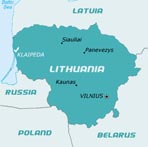Lithuania has high hopes in Vilnius culture capital role
 Vilnius - As one of Europe's two Capitals of Culture for 2009, the Lithuanian capital Vilnius hopes it can raise its profile and repeat what happened exactly 1,000 years ago, when the name "Lithuania" was first recorded in writing.
Vilnius - As one of Europe's two Capitals of Culture for 2009, the Lithuanian capital Vilnius hopes it can raise its profile and repeat what happened exactly 1,000 years ago, when the name "Lithuania" was first recorded in writing.
"We have two reasons to celebrate - first Vilnius will become the European Capital of Culture and the second, even bigger reason is that Lithuania will celebrate the millennium of its name," Vilma Janulyte, head of communications for the Vilnius 2009 organization told Deutsche Presse-Agentur dpa.
Organizers expect around three million people will visit and participate in a programme of 900 different art and cultural events scheduled over the course of twelve months.
Advance publicity has been under way for some time in 10 European countries incorporating over 500 promotional TV clips and 6,000 poster sites.
The advertising blitz attempts to tackle what is seen as Lithuania's main image problem: that it doesn't actually have an image.
Despite being the largest of the three Baltic states, Lithuanians are perpetually annoyed that foreigners confuse their country with neighbouring Latvia or view it as a vague land probably located somewhere Eastern Europe rather than on the shores of the Baltic Sea.
The capital of culture title offers a chance to forge a clear Lithuanian identity overseas, and put Lithuania on the map in a literal sense, organizers believe.
Events get under way on the stroke of midnight on December 31 with a spectacular music and light show created by German artist Gert Hof.
But the credit crunch and the threat of a global recession has already impacted Vilnius' year in the limelight, before it has even started.
The total budget for the year originally totalled 85 million euros, including 55 million to be spent on new infrastructure projects, but that has now been reduced by 12 per cent as the Lithuanian economy slides towards recession.
"The cuts will not have any impact on the quality of the programme, but we have to adjust our plans in the circumstances," says Janulyte.
"Next year will be special for Lithuania despite the economic crisis. 60 per cent of the events are free of charge."
In a bid to improve personal attitudes that sometimes hark back to the years when Lithuania was a member of the Soviet Union, five hundred taxi drivers, waiters, hotel staff and managers have been attending free lessons to improve their customer service skills.
Violeta Makauskiene, director of marketing with the Lithuanian Development Agency, responsible for attracting investment to the country, said the timing could have been better.
"I feel it would have had much bigger impact if it had happened in 2008, because the economic crisis means the impact will not be as high. It's better to have something rather than nothing but I assume that it will not be as effective as if it had already been held. Definitely the number of visitors will not be as high as we had predicted even half a year ago," she said.
"All of the institutions involved in the image building of Lithuania were planning to do much more with more visibility, but now a number of initiatives have had to be cancelled. From that point of view the timing is not perfect," Makauskiene admitted.
Despite that, shee says Vilnius 2009 has been attractive enough for her to change her personal plans. "Usually I go away from Vilnius for the new year but this time I've decided to stay here for one reason only."
With a new government coincidentally taking power just before the festival is due to start, there is a sense that Lithuania may be able to make a fresh start in 2009.
Asked what will set Vilnius' effort apart from the cities that have preceded it, Vilma Janulyte had a ready answer.
"The European capital of culture has never travelled this far east before, so we think we will be able to add a bit of eastern spice," she said. "Compared to the other cities, I think Vilnius will be wild!" (dpa)